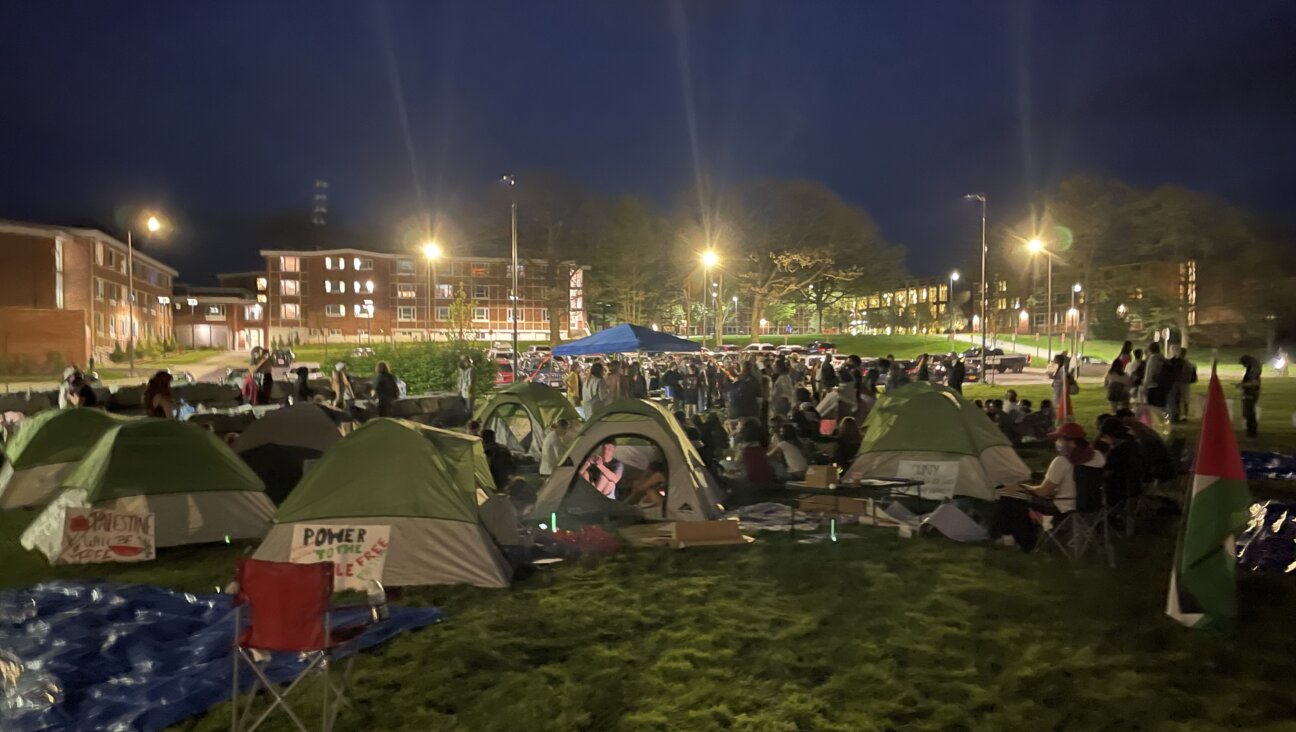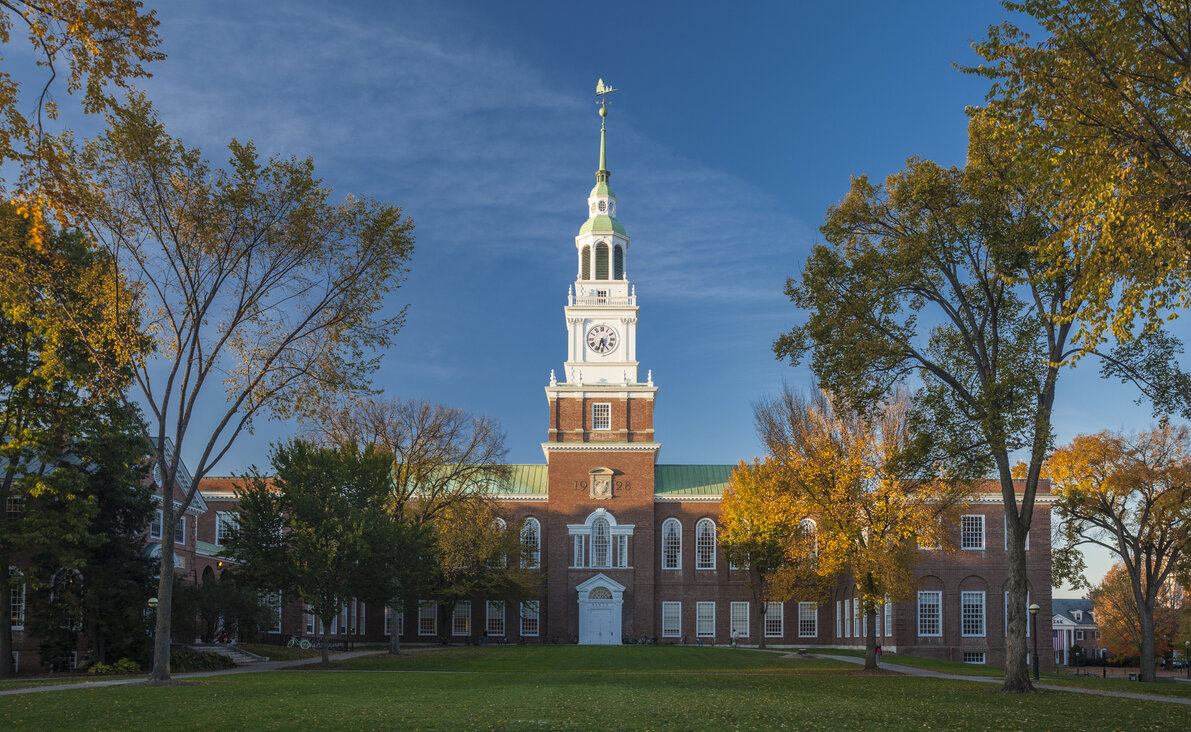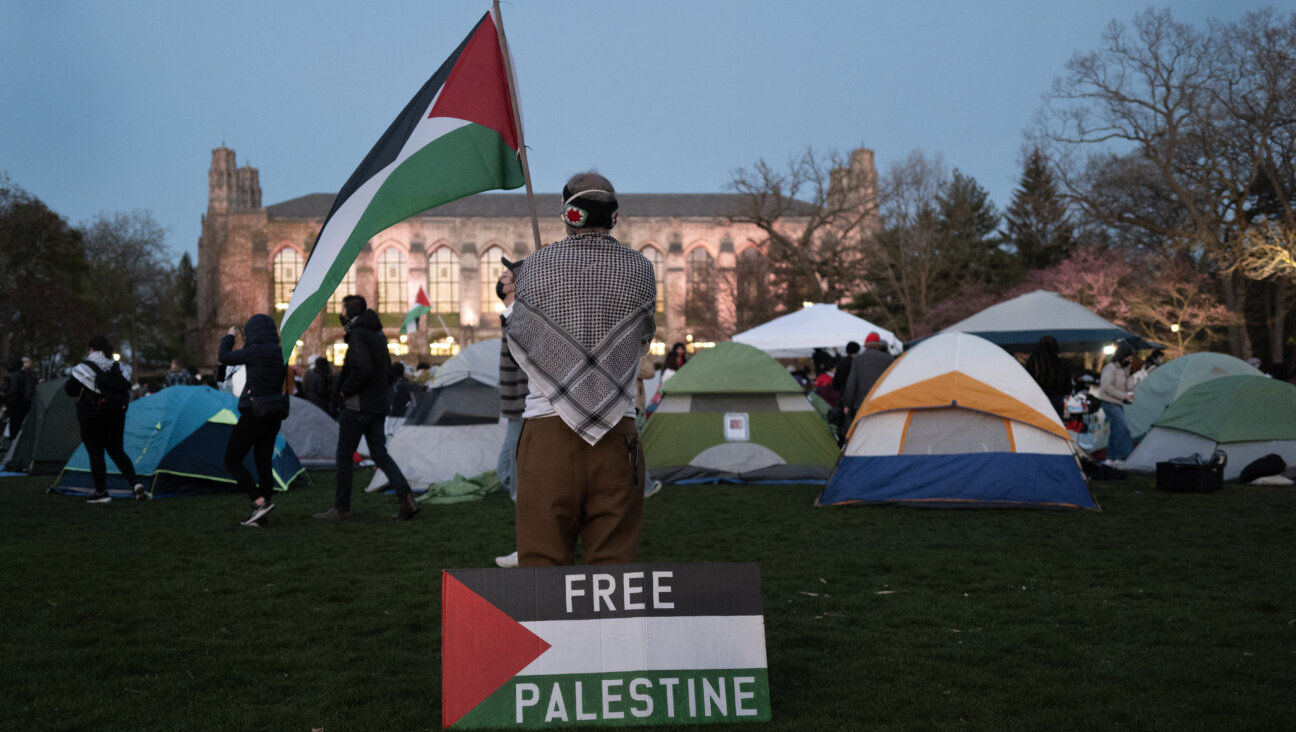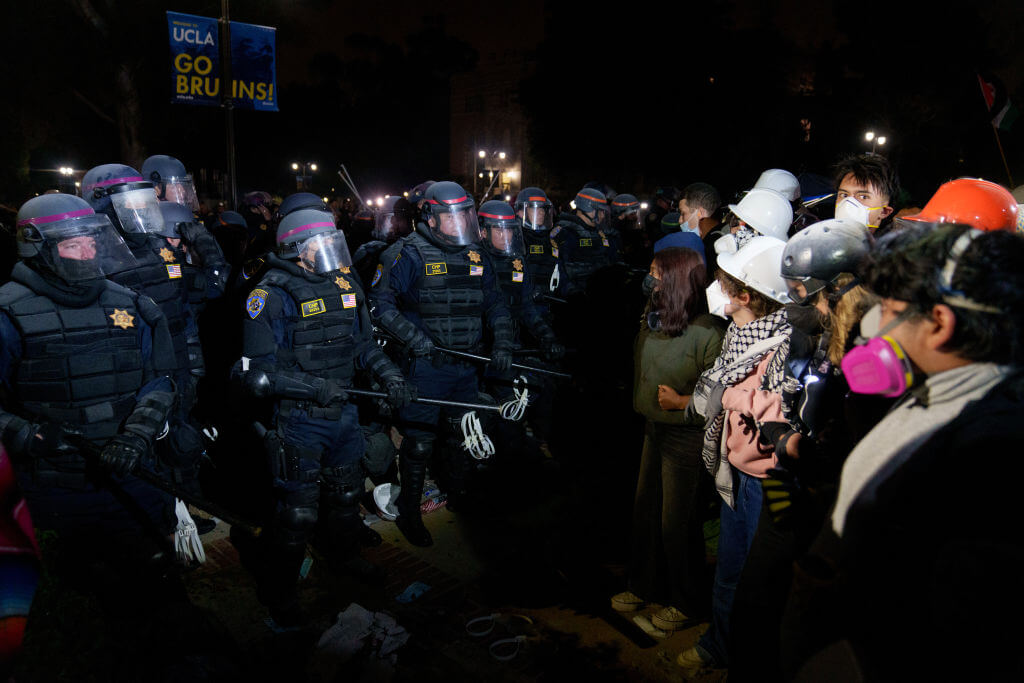A Jewish Farmers Movement: Revolutionary or Ridiculous?
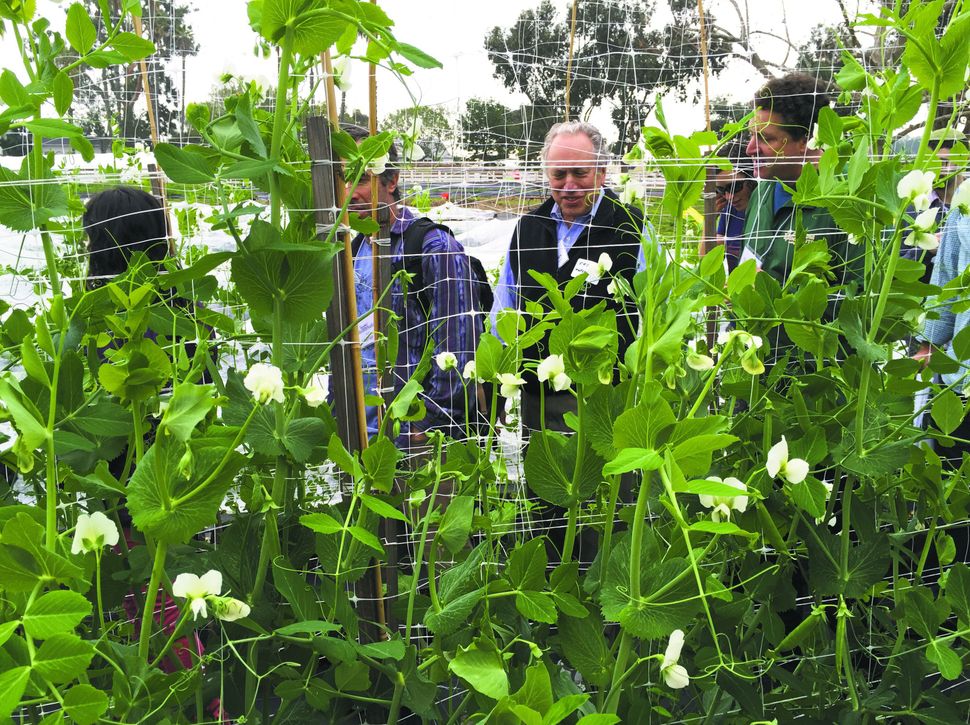
Pea Trellis: Surrounded by fellow convenors, Fred Margulies of Pushing the Envelope Farm is framed by the Coastal Roots Farm’s pea flowers. Image by Dan Friedman
The unfailing response from people when I tell them I’m going to the Jewish farmers conference here, just outside San Diego, is a smile to see if I’m joking. Then, when it’s clear I’m serious, comes: “I didn’t know that there were any Jewish farmers.”
There are. And the fact that they were holding their “second annual convening” on a ranch that until recently was producing 90% of America’s Christmas poinsettia plants shifts the notion of such a conference from the unlikely to the surreal.
The serious critique behind the laughter is that the enterprise of Jewish farming is so small and so little known that it might blink out of existence. But even if it doesn’t, many find risible the notion of small Jewish farms co-existing — if not really competing — in a sphere dominated by corporate agribusiness. As a niche venture within the larger sustainable farm movement (itself a niche), Jewish farming might be just a pie in the sky dream of a group of tree-hugging farmers and their funders who overvalue hope.
Fifty or so participants from 15 farms and funders faced these problems head-on in the low-slung Barn 2 of the Leichtag Foundation’s Coastal Roots Farm. As befits farmer-educators, dress was casual, but the discussion was respectful, thoughtful and insightful. Led by Yoni Gordis from the ChangeCraft consulting firm, discussions regularly left the informal chair circle (“Farmers don’t do too well sitting in hard chairs for a long time!”) to form breakout groups spread on sofas and dining tables around the broad, whitewashed room.
Except for a few veterans, the farmers were aged between 25 and 45. Most seemed to have either recently graduated college or recently become parents, and they were happy to acknowledge that the current low pay and lack of health benefits make Jewish farming a dubious vocation for a nice Jewish girl or boy. With few recognized paths into or away from the profession (Jewish farms don’t actually train you to be a farmer), and little chance of finding desirable living conditions for a family, it’s not yet clear how a recent college graduate who saw herself as an advancing professional could even make “Jewish farming” a career choice.
But for those committed to the movement, it offers the opportunity to reconnect with the earth in a vital way, and, in doing so, to help secure a vibrant future for the American Jewish community. It’s a way of showing the relevance of Jewishness to a generation that often doesn’t see its values reflected in local synagogues or Jewish community centers — especially to the 90% of Jews who classify themselves as non-Orthodox.
Instead of a visit to Israel via Birthright to connect to the Holy Land, they can reclaim American soil as a kind of ethical Jewish Earthright. As the 2014 Jewish Outdoor, Food & Environmental Education report “Seeds of Opportunity” put it, “Participating in immersive JOFEE programs inspires a positive connection to Jewish life, learning and meaning, particularly among participants who are younger [and] had fewer Jewish childhood experiences.”
The movement’s proponents eagerly point out Judaism was developed by people living on the land. As Aaron Gross, head of the Jewish Initiative for Animals, which launched at the convening, put it, “the Judaism of the Bible and the ancient rabbis is quintessentially agrarian — a religion of herding and harvesting, of seed and soil.”
Our best stories and our best ethics come from an explicitly farming society. In the story of Ruth, Ruth’s loyalty to her mother-in-law, Naomi, leads the two women to glean from the fields of the admirable Boaz. The characters’ positive traits are closely bound up with their attitudes to farming and humanity — so much so that we know Boaz and Ruth, who eventually marry, as the progenitors of King David and his line, which will reputedly produce a messiah.
I could relate to that. Maybe, I thought, these farms and organizations can also form a vanguard that can lead a continent-wide paradigm shift in how we (as Jews, and also as Americans) relate ethically and healthily to our food and environment. The starting bar could be low: If every Jewish organization had a policy on ethical food procurement that was even as stringent as that of McDonald’s the difference would be huge.
At the mid-January conference, discussion proceeded on a businesslike level while people’s fears and hopes flickered between these two poles: On the one hand, the people in the room might effect a transformation of American Judaism and America itself; on the other hand, maybe this was just the first phase in the inevitable dissolution of an absurd experiment.
In the modern era, Jewish farming has had its flourishing periods and its collapses. Most recently, during the past century, when Jews moved out from under the shadow of European laws that constrained them from owning land, a variety of initiatives sprouted up to help them return to farming, in part as a path to redeem themselves. These included institutions as diverse as the Federation of Jewish Farmers; Der Idisher Farmer, an illustrated magazine in Yiddish and English, and an agricultural fair on Manhattan’s Lower East Side that drew 50,000 visitors in 1909. The movement waxed along with the Zionist back-to-the-land initiatives and kibbutz movement. Indeed, they were often funded from similar sources, such as Baron Maurice de Hirsch, the wealthy German philanthropist who funded Jewish resettlement across the Americas and in what was then Palestine. But outside the Middle East, the Jewish agriculture movement waned in the 1960s and by the end of the ’70s had vanished entirely.
The Leichtag ranch gathering offered no illusions of a rapid rebirth. It was a small conference from a handful of organizations in North America, and one from Israel. But the group, with members hailing from Putnam Valley, New York; Denver and Boulder, Colorado, and Berkeley and Malibu, California, among other places, was larger than it was last year. And — with due apologies for puns — they saw themselves as developing the field and planting the seeds for future growth.
The participant organizations themselves were diverse, including Pushing the Envelope, a 14-acre educational farm in Geneva, Illinois, outside Chicago, on an exurban strip with low-rise businesses that Rabbi Fred Margulies set up in 2007 just near his Continental Envelope factory. Abundance Farm, another group in attendance, is a project of Congregation B’nai Israel in Northampton, Massachusetts. Shoresh in southern Ontario, has three locations, one of which is the Bela Farm with 30 active bee hives, just a short drive from Toronto.
The religious commitments of the attendees varied. On the one hand were those whose passion is for a Jewishly inflected sense of social justice. On the other were those affiliated with synagogues or otherwise Torah observant. “We try to be Earthodox” Jakir Manela, executive director of Maryland’s Pearlstone Center, told me with a smile.
In the face of an early worry that the organizations might not, in fact, have anything in common with one another, Adam Berman, the charismatic head of Berkeley’s Urban Adamah project, encapsulated their shared motivations concisely in a Venn diagram. What the different organizations share, he told the group during a discussion on the future of the field, was varying degrees of commitment to three intersecting areas: Jewish values, social justice and environmental sustainability.
I was skeptical that this combination was a winning one. Jews live in cities. We may be disproportionately politically progressive, but surely for most Jews, that has more to do with issues like legalizing same-sex marriage than with planting pea trellises. I spoke with Nigel Savage, founder, president and CEO of Hazon, an organization that partners with other groups to promote a healthy and sustainable Jewish community, as the sun set in the Hazon West office at the Encinitas ranch. From his experience of traveling around the continent, he sought to explain how he saw it.

Breaking Out: In discussion are (clockwise from left), Janna Siller from Hazon, Becca Weaver from Boulder JCC, Jakir Manela from the Pearlstone Center, Nigel Savage from Hazon and Sarah Chandler from JIFA. Image by Jax Meyers
“From a historical perspective the American Jewish community is still young and changing, especially out here in the West,” he said. “The sociological needs of the American Jewish community that were met by the suburban synagogues no longer clearly hold. We need to try different models, and this seems to be one that works.”
Savage pointed to the very venue in which we were talking. “There were 60,000 Jews in the North County region of California,” he noted, with no real institutions to serve them. “So Leichtag sets up a farm, and suddenly there’s a community center with 1,500 people in a field for Sukkot.”
Along with Tu B’Shvat, the holiday known as the Jewish “New Year for Trees,” Sukkot is a key exhibit for those seeking to highlight the importance of nature to Judaism. The festival’s metaphorical message of humility and impermanence, as symbolized in the tradition of eating in temporary booths for eight days, pales against its core meaning as a fall harvest festival. And Leichtag has been able to move from metaphor back to practice.
The Leichtag Foundation is the legacy of the owners of MD Pharmaceutical, Inc., Max “Lee” Leichtag and his wife, Andre “Toni” Leichtag. Initially a family philanthropy, it was later led by their daughter, Joli Ann Leichtag, until her death from cancer in 2007. Since then, under the leadership of the ebullient James Farley, a former lawyer, the foundation has become independent, spelled out its mission and grasped its opportunity.
Before taking over as CEO and president of the foundation, Farley had spent over a decade as its general counsel. With him at its head, Leichtag has embraced four strategic goals and bought the ranch at Encinitas to be the foundation’s “most prominent tool” in achieving them. It aims to alleviate poverty in San Diego, build Jewish life and institutions in San Diego, build relations between San Diego and Israel, and help build the social infrastructure of Jerusalem.
Inspired by “ancient Jewish traditions that connect people to community, food, the land and social justice” the farm grows food for San Diego’s neediest, while providing a center for Jewish life in the area.
But the challenge for the Jewish farming movement is not really its ability to convince committed Jews to champion sustainable causes, but rather to show other, more casually committed Jews how respect for animals, the earth and nature is at the heart of the Jewish ethical system. Even more complicated is showing how Jewish values can help frame approaches to the environmental crises facing humankind: fertilizer runoff, soil depletion, drought, climate change, factory farming, genetic modification and more.
One of Leichtag’s most ambitious plans for its Coastal Roots Farm on the Encinitas Ranch is to build the continent’s largest food forest. The project is a nine-acre orchard, but not just an orchard. The idea — already many seedlings toward fruition — is to plant a series of trees along the north side of the farm that will join a neighboring botanical garden to the ocean. With this as an attraction, the planners hope to bring hikers through the farm and to illustrate the principle of pe’ah, the mandate to leave the corners of a field free for needy members who can pick produce there from the land. (In this case, the forest can also hide an ugly housing development to the north.)
Because the trees are mostly fruit bearing — and, thanks to the nearby Exotica Rare Fruit Nursery, genetically diverse — pedestrians will be able to pick for themselves or others while strolling through. Schools, food banks, and the hungry will be able to walk through the edible landscape for recreation or edification, while picking fruit to eat or learning about nature, systems of food production or the Jewish values that underpin the farm. The plan highlights farmers as stewards of the land, with a responsibility to the soil itself and to the society that surrounds them.
It’s a deeply attractive idea and, with planting well underway, plans for it to be ready in 2017 seem anything but far-fetched. Eco-entrepreneur and consultant to numerous bio-dynamic developments, Daron Joffe — also known as Farmer D — is the steady hand overseeing this, as with all the farm.
Coastal Roots Farm, where all this is taking place, stands as a slightly blessed microcosm of the nascent movement. A 67-acre farm situated in the middle of an underserved Jewish community, the farm is supported by a foundation with more than $100 million in assets and is led by an enthusiastic backroom team in the always-summer of Southern California. It would seem to have everything it needs to succeed.
Yet, even Coastal Roots faces serious challenges, ranging from the land’s physical sustainability to the group’s own personnel. California has drained its aquifers and now seems beached in a perpetual drought. To compensate, the farm’s stewards must create swales and runoffs to make the land self-hydrating.
Moreover, like so many of the organizations at the conference, its small scale offers so few professional positions at so few levels that the men who are (vastly disproportionately) managing the enterprise have nowhere to go. This, in turn, blocks the pipeline for younger men and women seeking work in the field (so to speak).
These are questions with which the conference frankly grappled. Its participants are clearly driven by passion for a world in which each generation gives the next an earth renewed by a care that is guided by ancient Jewish values. Though bound to some extent by the physical and economic systems they seek to reform, they hope that by embracing their ancestors they will secure their descendants.
Contact Dan Friedman at [email protected], or follow him on Twitter at @danfriedmanme

I hope you appreciated this article. Before you go, I’d like to ask you to please support the Forward’s award-winning, nonprofit journalism during this critical time.
Now more than ever, American Jews need independent news they can trust, with reporting driven by truth, not ideology. We serve you, not any ideological agenda.
At a time when other newsrooms are closing or cutting back, the Forward has removed its paywall and invested additional resources to report on the ground from Israel and around the U.S. on the impact of the war, rising antisemitism and the protests on college campuses.
Readers like you make it all possible. Support our work by becoming a Forward Member and connect with our journalism and your community.
Make a gift of any size and become a Forward member today. You’ll support our mission to tell the American Jewish story fully and fairly.
— Rachel Fishman Feddersen, Publisher and CEO
Join our mission to tell the Jewish story fully and fairly.








